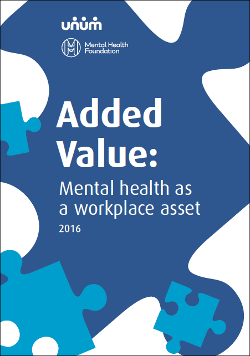Ungated Post | 30 Nov 2016
Added Value: Mental health as a workplace asset

This study, done in collaboration with the Mental Health Foundation, explores the experiences of people with mental health problems, assesses their contribution to the UK economy, and estimates the costs that mental health problems impose on the UK economy through foregone output.
As detailed in the Appendix, we found that people with mental health problems made up an estimated 15.9 percent of total employment in 2015. Of these, 75 percent worked in the private sector.
In 2015, people with mental health problems are estimated to have contributed £226 billion to UK GDP (12.1 percent the country’s economic output). That is nine times more than the cost of mental health problems to economic output: an estimated £25 billion in foregone gross value added the UK economy missed out on because people with mental health problems could not join the labour force, were less productive at work, took sick days off work, or required informal carers to leave the labour force.
Businesses should pay attention to the costs of mental health problems: an estimated £19 billion, or 76 percent, of the total foregone gross value added is estimated to affect the private sector.
Oxford Economics’ team is expert at applying advanced economic tools that provide valuable insights into today’s most pressing business, financial, and policy issues.
To find out more about our capabilities, contact:
Americas
Diantha Redd
+1 (646) 503 3052
Email
Asia Pacific
Peter Suomi
+65 6850 0110
Email
EMEA
Aoife Pearson
+44 (0)203 910 8054
Email
Related Services

Post
The economic impact of abandoning the WTO
Oxford Economics have been commissioned by the International Chamber of Commerce (ICC) to provide an independent assessment of the economic impact of WTO dissolution. This report details our findings and the assumptions underpinning our analysis.
Find Out More
Post
The economic impact of the sports activities of public service media
This study shows how the sports activities of public service media supported €4.5 billion of GDP and 57,000 jobs across 31 European countries in 2022. The report also highlights wider economic benefits of public service media sports coverage, such as the way in which it leverages sponsorship income for sports bodies.
Find Out More
Post
Global Trade Education: The role of private philanthropy
Global trade can amplify economic development and poverty alleviation. Capable leaders are required to put in place enabling conditions for trade, but currently these skills are underprovided in developing countries. For philanthropists, investing in trade leadership talent through graduate-level scholarships is an opportunity to make meaningful contributions that can multiply and sustain global economic development.
Find Out More